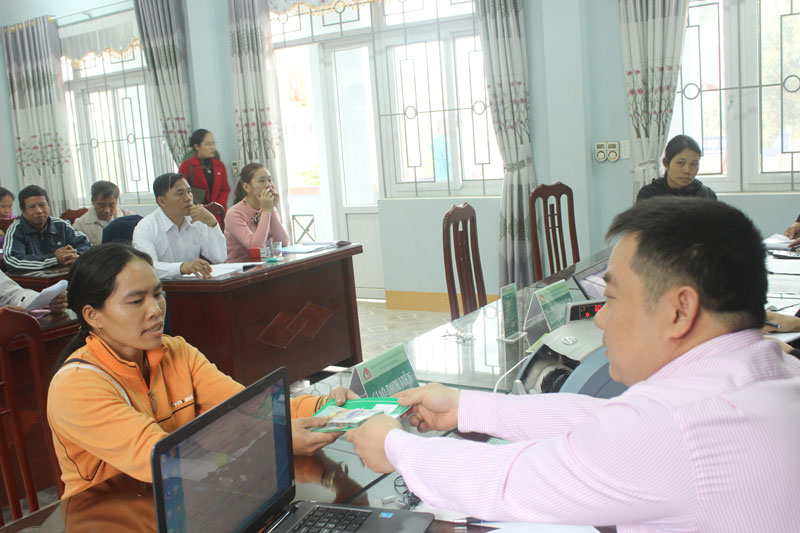
(HBO) – Over the past years, Tong Dau commune (Mai Chau) has been interested in implementing the hunger elimination and poverty reduction. Particularly, thanks to preferential loans of Social Policy Banks, the local people have used the capital for the right purposes with many effective economic models, contributing to increasing the income and improving the people's living conditions. By the end of 2017, the poverty household rate of the commune was 7.3%; the rate of near poor households was 7.8%; the average income per capita reached at 25 million VND.

Ms. Vi Thi Xien, Tong village, Tong Dau
commune (Mai Chau) was given a new loan of 30 million VND from poor households
to invest in raising cows.
Up to now, Tong Dau commune has 11 groups of
savings and loans with 343 members operating in 6 villages. At present, the
commune has implemented 9 policy credit programs with a total outstanding debt
of over 6.4 billion VND, including: programs for poor households, near poor
households, no, poor households, poor households, poor households, poverty
escaping households, clean water and environmental sanitation, production –
business, students – pupils, career solutions, housing issues and ethnic minorities. In particular, the loan program of
clean water and environmental sanitation has the highest debt (over 2.8 billion
VND) with 228 borrowing households; poor households with the debt of over 1
billion VND with 38 borrowing households; the near poor households with the
debt of over 1.2 billion VND with 43 households borrowed, etc. Until March
2018, the savings of the group reached over 300 million VND. In particular, the
commune has no overdue debt; 100% of the groups are ranked at good level.
Mr. Ha Van Tich, the Chairman of Tong Dau
commune People's Committee said: The policy loan program has received the high
agreement, unity of the Party committees, authorities and the local people.
Monthly, the Social Policy Banks transacts at the commune on a fixed date, so
it becomes favorable to conduct the eamination and disbursement loans. Thanks
to loans borrowed and assistance in farming techniques and livestock raising
methods, many households have improved from poverty households to become quite
good ones. In 2017 and the first 3 months of 2018, from the source of policy, the
households have invested in building, repairing and upgrading 82 clean water
projects, 82 sanitation works; building 5 new houses; creating jobs for 7
employees, etc.
In order for the policy capital to be more
effective, contributing to the achievement of sustainable poverty reduction
targets in the commune, in the coming time, all the associations, trustees and
communal authorities closely cooperated with the District Social Policy Bank to
deploy and implement the policy capital. Accordingly, they focus on propaganda,
timely disbursement of capital to the local people. At the same time, they
regularly inspect and supervise to direct the local people to use capital for
the right purposes and efficiency. The task of choosing the poor, near-poor
households for borrowing the loans is focused, oriented without spreading,
giving priority to the households who have enough conditions to the program
beneficiaries, having clear production plans, good management at the capacity
of loans, etc.
The process of selection is in collaboration
with the participation of organizations, associations, village leaders to
ensure that the amount of loans is suitable with the production plan. The
commune expects to supplement the loans to poor households, near poor
households and policy beneficiaries to help those households raise their
production capital, stabilize their life and escape sustainable poverty, and
better serve the poverty reduction task in the commune. – The Commune People's
Committee Chairman stressed.
More than just an information technology teacher, Bui Van Nien is an inspiring figure who has nurtured the scientific curiosity and creative spirit of students in Vietnam’s ethnic minority communities.
Da Bac is the most disadvantaged mountainous district in Hoa Binh province, with ethnic minorities accounting for about 90% of its population. Over the past years, the district has mobilised resources to implement ethnic policies to improve the quality of life of local people.
In recent years, Hoa Binh province has consistently prioritised the protection, care, and education of children, particularly those from ethnic minorities and disadvantaged backgrounds, by creating a safe, healthy, and nurturing environment for their all-round development.
The Steering Committee for Tobacco Harm Prevention and Control of Hoa Binh province, in coordination with the Tobacco Harm Prevention and Control Fund, held a ceremony on May 28 in response to the World No Tobacco Day (May 31) and the National No Tobacco Week (from May 25 to 31). The event was chaired by Nguyen Van Toan, Standing Vice Chairman of the provincial People’s Committee and head of the Steering Committee.
Since 2021, the Center for Industrial Promotion and Industrial Development Consulting (CIIDC) under the Department of Industry and Trade has been implementing a school lighting model as part of the plan for using energy efficiently and economically in Hoa Binh Province in the pẻiod of 2021 - 2025. This model not only aims to improve the learning conditions and enhance the education quality, but it also promotes the message of energy saving, energy security, environmental protection and contributes to the goals of socio-economic development.
In the 2024 - 2025 school year, the entire Hoa Binh provincial education sector includes 520 educational institutions and schools. Among them are 13 ethnic boarding schools with 153 classes and 4,487 students. Four of these schools have met national standards, reaching 30.7 percent.



